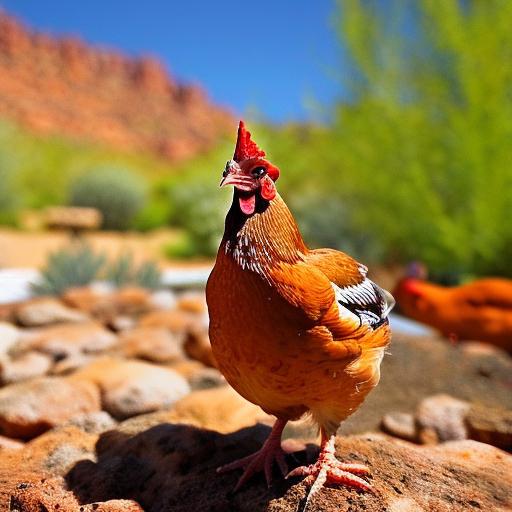Understanding heat stress in chickens is crucial for their overall health and well-being, especially in hot climates like Arizona. As a chicken owner myself, I have experienced the challenges of keeping my flock cool during scorching summers. It is important to create a comfortable living space for chickens and provide them with ample shade, ventilation, and hydration to prevent heat stress. In this article, we will explore the risks of heat stress in chickens, discuss strategies for creating a cool living space, and provide tips for keeping your flock healthy and hydrated during hot weather.
Key Takeaways
- Heat stress can be a serious risk for chickens in hot climates like Arizona.
- Creating a cool and comfortable living space with ample shade and ventilation is crucial for preventing heat stress.
- Choosing the right breeds for hot climates can also help reduce the risk of heat stress.
- Proper hydration and feeding strategies are important for keeping chickens healthy and hydrated in the heat.
- It’s important to understand the signs of heat stress and know how to provide first aid and emergency care if needed.
Understanding the Risks of Heat Stress in Chickens
Heat stress occurs when chickens are unable to regulate their body temperature effectively. Chickens are more susceptible to heat stress than other animals because they lack sweat glands and rely on panting to cool down. When the ambient temperature rises above 90 degrees Fahrenheit, chickens can struggle to dissipate heat, leading to dehydration and even death.
The dangers of heat stress in chickens are significant. Dehydration is a common consequence of heat stress, as chickens lose water through panting and increased respiration. Dehydration can lead to reduced egg production, poor egg quality, and even death if left untreated. Additionally, heat stress can cause a decrease in feed intake, resulting in weight loss and reduced overall health.
Creating a Cool and Comfortable Living Space for Your Flock
Designing a chicken coop that is well-ventilated and shaded is essential for keeping your flock cool during hot weather. Start by selecting a location for the coop that receives ample shade throughout the day. Avoid placing the coop in direct sunlight or areas with poor air circulation.
Consider using materials that can help keep the coop cool. Shade cloth can be installed over the roof or sides of the coop to provide additional shade and reduce direct sunlight exposure. Misters or sprinklers can also be used to create a cooling effect inside the coop. These can be set on timers to periodically mist the chickens and cool down the environment.
Providing Ample Shade and Ventilation in the Chicken Coop
| Metrics | Description |
|---|---|
| Temperature | The average temperature inside the chicken coop should be between 50-80°F (10-27°C) to ensure the comfort of the chickens. |
| Humidity | The humidity level inside the chicken coop should be between 40-60% to prevent respiratory problems in the chickens. |
| Airflow | The chicken coop should have ample ventilation to ensure fresh air circulation and prevent the buildup of harmful gases. |
| Shade | The chicken coop should have adequate shade to protect the chickens from direct sunlight and prevent overheating. |
| Roosting Space | Each chicken should have at least 8-10 inches of roosting space to ensure they can comfortably perch and sleep at night. |
| Nesting Boxes | The chicken coop should have enough nesting boxes for the number of chickens, with each box measuring at least 12×12 inches. |
Providing shade and ventilation in the chicken coop is crucial for preventing heat stress. Shade helps to reduce the temperature inside the coop, while ventilation allows for the exchange of hot air with cooler air from outside.
One way to create shade in the chicken coop is by planting trees or shrubs around the perimeter. This not only provides shade but also helps to create a more natural and comfortable environment for the chickens. Another option is to use umbrellas or shade sails to cover specific areas of the coop where chickens spend most of their time.
Ventilation can be achieved by installing windows or vents in the coop. These openings allow for the circulation of fresh air, which helps to cool down the environment. It is important to ensure that the openings are large enough to allow for proper airflow but small enough to prevent predators from entering.
Choosing the Right Breeds for Arizona’s Hot Climate
When selecting chicken breeds for a hot climate like Arizona, it is important to choose breeds that are well-suited for high temperatures. Some breeds have better heat tolerance and are more adapted to hot climates than others.
Breeds such as Leghorns, Rhode Island Reds, and Sussex are known for their heat tolerance and ability to withstand hot weather. These breeds have lighter feather colors, which help reflect sunlight and reduce heat absorption. They also have larger combs and wattles, which aid in heat dissipation through increased blood flow.
On the other hand, breeds with heavy feathering or smaller combs and wattles may struggle more in hot climates. Breeds such as Silkies or Cochins may require extra care and attention during hot weather to prevent heat stress.
Hydrating Your Chickens: Watering Tips and Tricks

Keeping chickens hydrated is crucial during hot weather. Provide clean, cool water to your flock at all times. Ensure that the water containers are large enough to accommodate the entire flock and are easily accessible.
Consider using waterers with nipples or cups instead of open containers. This helps to prevent contamination and keeps the water cool for longer periods. It is important to regularly clean and refill the water containers to ensure that the water remains fresh and free from debris.
To encourage chickens to drink more water, you can add electrolytes or apple cider vinegar to their drinking water. These additives help replenish essential minerals and promote hydration. However, it is important to follow the recommended dosage and consult with a veterinarian if necessary.
Feeding Strategies to Keep Your Chickens Healthy and Hydrated
Feeding strategies can also play a role in keeping chickens healthy and hydrated during hot weather. Provide a balanced diet that includes high-quality feed, fresh fruits, and vegetables. Avoid feeding excessive amounts of grains or treats, as these can increase body heat production.
Consider offering watery fruits and vegetables such as watermelon, cucumbers, or lettuce. These foods not only provide hydration but also help cool down the chickens from the inside out. You can also freeze fruits or vegetables and offer them as a refreshing treat on hot days.
It is important to monitor feed consumption during hot weather. If chickens are eating less than usual, it may be a sign of heat stress. In such cases, consider offering smaller, more frequent meals throughout the day to encourage feed intake.
Understanding the Signs of Heat Stress in Chickens
Recognizing the signs of heat stress in chickens is crucial for early intervention and treatment. Some common symptoms of heat stress include panting, open-mouthed breathing, lethargy, reduced feed intake, droopy wings, and pale combs and wattles.
Chickens may also seek shade or lie down on cool surfaces when they are experiencing heat stress. They may exhibit signs of distress, such as stretching their necks or wings, in an attempt to cool down. It is important to observe your flock closely and take immediate action if you notice any of these symptoms.
Treating Heat Stress in Chickens: First Aid and Emergency Care
If you suspect that a chicken is experiencing heat stress, there are several first aid measures you can take to help cool them down. Move the chicken to a shaded area or indoors where it is cooler. Offer cool water for drinking and consider wetting the chicken’s feathers with cool water or placing them in a shallow tub of water.
It is important to monitor the chicken closely and ensure that it is responding positively to the cooling measures. If the chicken’s condition does not improve or worsens, it may be necessary to seek veterinary care. Heat stress can quickly escalate into a life-threatening condition, so it is important to act promptly.
Preventing Heat Stress in Chickens: Best Practices and Proactive Measures
Preventing heat stress in chickens is always better than treating it. There are several best practices and proactive measures you can take to keep your flock cool and healthy during hot weather.
Ensure that the chicken coop is well-maintained and free from debris. Regularly clean the coop to prevent the buildup of waste, which can contribute to heat stress. Provide ample shade and ventilation as discussed earlier, and regularly monitor the temperature inside the coop.
Consider using fans or misters in the coop to provide additional cooling. These can be set on timers to automatically turn on during the hottest parts of the day. You can also provide frozen water bottles or ice packs for chickens to lie next to, which helps lower their body temperature.
Staying Cool Yourself: Tips for Keeping Your Own Cool During Arizona Summers
Caring for chickens in hot weather can be physically demanding, so it is important to take care of yourself as well. Here are some tips for staying cool while tending to your flock:
1. Wear light-colored, loose-fitting clothing that allows for air circulation.
2. Use sunscreen to protect your skin from the sun’s harmful rays.
3. Take frequent breaks in shaded areas and stay hydrated by drinking plenty of water.
4. Consider using a hat or umbrella to provide additional shade.
5. Avoid working during the hottest parts of the day and schedule tasks for early morning or late evening when temperatures are cooler.
Understanding heat stress in chickens is crucial for their overall health and well-being, especially in hot climates like Arizona. By creating a cool and comfortable living space, providing ample shade and ventilation, choosing the right breeds, and implementing proper hydration and feeding strategies, you can prevent heat stress in your flock. It is important to recognize the signs of heat stress and take immediate action to treat and prevent further complications. Remember to also take care of yourself by staying cool and hydrated while caring for your chickens. With these strategies in place, you can ensure that your flock stays healthy and comfortable during hot weather.
If you’re living in Arizona and raising chickens, you know how important it is to keep them cool in the scorching heat. One essential aspect of ensuring their comfort is providing them with the right kind of coop. In a related article on Poultry Wizard, you can learn about the best coop options for chickens and how they can help in maintaining a cool environment for your feathered friends. Check out the article here to discover the ideal coop design that will keep your chickens comfortable even in the Arizona heat.
FAQs
What is the ideal temperature range for chickens?
Chickens are comfortable in temperatures ranging from 50-80°F. However, they can tolerate temperatures up to 90°F if they have access to shade and water.
What are the signs of heat stress in chickens?
Signs of heat stress in chickens include panting, lethargy, loss of appetite, decreased egg production, and in severe cases, death.
How can I keep my chickens cool in Arizona?
To keep chickens cool in Arizona, provide shade, plenty of fresh water, and good ventilation in the coop. You can also use misters or fans to help lower the temperature.
What kind of shade is best for chickens?
The best kind of shade for chickens is natural shade from trees or shrubs. If natural shade is not available, you can use tarps or shade cloth to create shade.
How often should I change my chickens’ water in hot weather?
In hot weather, you should change your chickens’ water at least twice a day to ensure it stays cool and fresh.
Can I give my chickens ice water to cool them down?
No, you should not give your chickens ice water to cool them down. Cold water can shock their system and cause them to go into shock. Instead, provide cool, fresh water and shade to keep them comfortable.
What should I do if I suspect my chickens are suffering from heat stress?
If you suspect your chickens are suffering from heat stress, move them to a cooler area immediately and provide them with cool water. You can also use a fan or misters to help lower the temperature. If their condition does not improve, contact a veterinarian.
Meet Walter, the feathered-friend fanatic of Florida! Nestled in the sunshine state, Walter struts through life with his feathered companions, clucking his way to happiness. With a coop that’s fancier than a five-star hotel, he’s the Don Juan of the chicken world. When he’s not teaching his hens to do the cha-cha, you’ll find him in a heated debate with his prized rooster, Sir Clucks-a-Lot. Walter’s poultry passion is no yolk; he’s the sunny-side-up guy you never knew you needed in your flock of friends!







